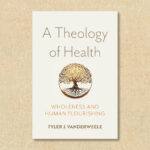The first day I ventured through the church doors, no one knew I fought the compulsion to throw myself off a bridge.
I had drifted about for months with a shroud draped over my mind. Joy had vanished, its remnants yellowed photographs that crumbled to dust when I reached for them. As a physician, I understood my anguish and could describe its chemical mechanisms with precision. I could define clinical depression, deconstruct it. Yet as I sat there that day with the Bible heavy on my lap, despair crowded out my will to live. Never before had living felt so much like dying.
Fellow churchgoers noticed I neither lifted my voice in song, nor bowed my head in prayer. Many rightly deduced that church was foreign to me. No one, however, could perceive the severity of my groaning, because like other mental illnesses, clinical depression is a hidden disability. It leeches all light from life, but does so without visible scars. It skulks behind everyday routines. We go to work and pick up our kids from school, but struggle to breathe. We force a smile, while our regard for life erodes away. As Charles Spurgeon described, “The flesh can bear only a certain number of wounds and no more, but the soul can bleed in ten thousand ways, and die over and over again each hour.”
As I sat with the Bible heavy on my lap, despair crowded out my will to live. Never before had living felt so much like dying.
Suicide and depression have occupied the public consciousness of late, with the tragic losses of Kate Spade and Anthony Bourdain. Statistics further warn that as we gather each Sunday to worship and sing praises to God, we may stand shoulder to shoulder with people dying hourly. Wherever we journey in the world, roughly one in 10 people around us have borne a melancholy that willpower can’t surmount. In the United States, depression has a lifetime prevalence of 17 percent, and ranks second among all illnesses and injuries as a cause of disability (Kessler, Murray).

Lest we mistake depression as exclusively a disease of Western affluence, the World Health Organization ranks it as the 11th greatest cause of disability and mortality worldwide, and estimates the lifetime prevalence of depression across all continents as 12 percent, with a range of 9 percent to 18 percent (Murray, Kessler). Such figures hint that while we take the sacrament, pray, and recite the liturgy every week, others in our midst are grappling with despondency.
Our response to these silent sufferers must reflect our discipleship. For the Christian, affliction matters (Mic. 6:8; Matt. 5:7; Phil. 2:4; Gal. 6:2, 9–10). The call to love our neighbors is clear (Mark 12:31; John 13:34–35). Unfortunately, misconceptions about depression seep into the church, tainting our words. While the Bible urges us to open our arms to those crushed in spirit, too often sufferers of depression find the church to be a home for ridicule, rather than truth and love.
‘Real Christians Aren’t Depressed’
In my experience writing and teaching about depression, dialogue with other Christian sufferers has revealed an unsettling theme. As they strive to contextualize their illness within a biblical framework, they worry that depression reflects a deficit in faith. Some chastise themselves for being unable to overcome depression without medication. Others fear that depression reflects a puny faith, an imperfect acceptance of the gospel. The implicit fear is that depression and faith are incompatible. “Real” believers hope in the gospel, and so don’t get depressed.
Clinical depression is a hidden disability. It leeches all light from life, but does so without visible scars.
Further observations suggest that the church can worsen, rather than assuage, such feelings of guilt. In her article recounting her experience with depression, Alicia Cohn writes:
Unfortunately, many of us who have spoken up in church communities have been told to “pray harder” or “have more faith.” These suggestions might be well-intentioned, but they often discourage and isolate those of us in desperate need of support.
Likewise, in his book Spurgeon’s Sorrows, Zack Eswine writes:
In the eyes of many people, including Christian people, depression signifies cowardice, faithlessness, or a bad attitude. Such people tell God in prayer and their friends in person that the sufferer of depression is soft or unspiritual. (58)
Such comments demonstrate a faltering in love for our neighbors, a widening crack in the foundation of Christian empathy. As Christ’s followers we gladly leap into the mission field, cook meals for the destitute, and embrace the grieving; but when depression strikes, misconceptions can deteriorate this spirit of compassion. At best, we practice silence and avoidance. At worst, we blame the sufferer and disregard the depressed as too lax in faith to pull themselves from the depths.
Understanding the medical peculiarities of depression illuminates the vital need for partnership with our brothers and sisters until the light returns.
When we consider that the rate of suicide among the depressed is 27 times that of the general population, such thinking is egregious (Angst). Sufferers of depression can’t control their descent into darkness, nor can they wrench themselves from its clutches by sheer will. Loving our neighbor mandates that we lay aside ignorant reproach. Understanding the medical peculiarities of depression illuminates the vital need for partnership with our brothers and sisters until the light returns.
More Than Feeling Down
Clinical depression differs from grief and sadness, which are appropriate responses to a broken world. The Bible is replete with scenes of the aggrieved weeping and tearing their robes, lamenting over terrible loss and hardship (Job 3; Pss. 13:1–3; 22:1–2; 69:1–3). Even our Lord wept, first for the departed Lazarus (John 11:33–36), then over Jerusalem (Luke 19:41–42), and finally, as the man of sorrows the prophets foretold (Isa. 53:3; Matt. 26:36–46). Such examples reveal that our tears are God-given. As they dampen our faces, they provide a balm for our wounded hearts, and point to our need for a Savior.
Depression, on the other hand, differs from this God-given sorrow. In major depression, our tears flow for too long, and for reasons we can’t pinpoint. They persist long after wounds have healed. No matter how earnestly we strive to free ourselves from the depths, each day dawns bleaker, since depression originates not from the will, but from changes in the brain. It so devastates sufferers because of associated brain changes that impair the ability to experience joy.

Specifically, a diagnosis of major depression requires at least five of the following symptoms, nearly every day, for two weeks. At least one symptom must be depressed mood or anhedonia:
- Depressed mood (hopelessness, despair)
- Anhedonia (loss of pleasure in usual passions and activities)
- Weight loss/weight gain or change in appetite
- Insomnia/hypersomnia
- Psychomotor agitation/retardation (can’t sit still, or can’t get moving)
- Fatigue/loss of energy
- Feelings of worthlessness or guilt
- Inability to concentrate
- Recurrent thoughts of death or suicide (DSM-5)
Translated into everyday language, major depression is a pervasive disorder of mood and thought that deadens joy. The things that once inspired awe and delight lose their imprint. The mundane tasks of getting up in the morning, getting dressed, and going to work feel impossible—with 60 percent of sufferers unable to perform these simple daily activities (Kessler). As pastor Todd Peperkorn describes in his raw and poignant memoir on depression:
It is a frightful disease of the mind, turning one inward, sucking out the very marrow of a personality, until there is nothing left but darkness. It is a great weight that never lets up, never releases the sufferer from its crushing power. (9)
Research over the past decade reveals that the neurobiological underpinnings of this experience are intricate. Depression is associated with changes in brain chemistry, brain structure, and the connections between nerve cells. Many of us appear to be genetically prone to the disorder, and a family predisposition combined with an environmental influence—a devastating life event, substance abuse, medications, a complicating illness—places us at high risk for that first episode (Sullivan, Kendler).
Major depression is a pervasive disorder of mood and thought that deadens joy.
A review of these brain changes reveals why we can’t just “pull ourselves out of it.” In normal individuals, PET scans that evaluate cell metabolism reveal high levels of activity throughout the brain, with both hemispheres ablaze. The comparison with a scan in a depressed patient reveals a dramatic darkening, indicating a decrease in brain activity. The images are eerie. They appear as if a shadow has spilled over the depressed brain, stamping out the light.
In addition to this reduction in metabolic activity, regions of the brain responsible for memory and executive function shrink in longstanding depression, as do the pathways connecting these areas to sites controlling mood, fear, and drives (Koolschijn, Rao, Chen, Goodkind, Price, Kaiser). Brain cell loss is accelerated among the depressed (Philips, Koutsouleris, Schmaal, Zhao, Luby). The actions of multiple chemicals that relay messages between nerve cells are disrupted, especially for serotonin, a molecule important for regulating mood, sleep, appetite, and the experience of pain (Ogawa, Werner, Blier).
These neurobiological changes create profound disturbances in mood, motivation, focus, and the ability to engage in the stuff of life. Those with depression suffer from a bleakness they can neither comprehend nor control. And even when the depressed seek out help for a single episode, another descent into darkness often lurks months or years ahead.
Lifelong Affliction
Nine years after my initial steps through those church doors, my suicidal compulsions had receded into memory. As I sat in the pews with a toddler clinging to my hip and an infant fussing on my lap, I called those around me my dearest friends. I had accepted Christ into my life and knew the church as a beacon of fellowship and respite.
Then, seemingly out of nowhere, a shadow descended over my heart again. The urge to cry thrust me into silence while my friends and family sang praises to God. As joy drained away, my most fervent thoughts dwindled to monosyllables. Help me, I prayed. Lord, please. Not this. Not again.
As it so often does, the darkness had returned.
Depression is often a lifelong burden. Following recovery from a single episode, up to 40 percent of sufferers have recurrent symptoms within two years (Kang). After two episodes, up to 80 percent continue to have recurrences (Burcusa, Bulloch). These numbers mean that depression repeatedly taunts its victims over a lifetime. We gasp with relief when one episode releases us, but the risk of recurrence always lingers.
Challenges in treatment compound the problem. Many people who suffer from depression don’t receive adequate therapy, either because guilt and stigma discourage them from seeking help, or because healthcare disparities limit services (Thornicroft). Even when sufferers do seek help, treatment is an inexact science, and cure elusive.
While the Bible urges us to open our arms to those crushed in spirit, too often sufferers of depression find the church to be a home for ridicule, rather than truth and love.
The mainstays of therapy include antidepressant medications, which increase concentrations of serotonin in the brain, and psychotherapy. Although antidepressants can provide crucial stability, when used alone they facilitate full remission in only about 50 percent of cases (Papakostas, Gartlehner). Efficacy increases when antidepressants and psychotherapy are combined (Cuijpers), but even with this approach partial response is more common than complete resolution. Therapy may shorten the duration of an episode, or ameliorate the intensity of symptoms, but rarely does it completely eradicate the threat of darkness (Forte).
Further, when sufferers muster the courage to pursue therapy, they can face a plodding and debilitating course. Sixty percent of people who start antidepressant medication suffer side effects of diarrhea, nausea, vomiting, drowsiness, weight gain, sexual dysfunction, and anxiety (Gartlehner). Although some feel better within one to two weeks (Uher, Posternak), full remission usually requires six to 12 weeks of therapy (Papakostas, Trivedi, Romera). This delayed response means sufferers shoulder side effects while still immersed in despair. Unsurprisingly, the dropout rate for therapy is high, with many discontinuing antidepressants before symptoms resolve (Gartlehner).
The delayed and variable effectiveness of treatment can worsen feelings of guilt. As Zack Eswine writes, “Because of this slowness or absence of cure, sufferers of depression must daily withstand voices of condemnation. After all, Shouldn’t you be over it by now?” (58). Such disparagement may originate within the minds of sufferers, but fellow churchgoers hold the power either to fan that condemnation into flame, or to snuff it out. Our words matter (Matt. 15:18, Eph. 4:29). With them we may trample the downtrodden for the glory of our own lofty opinions. Or, we may embrace the suffering with open arms and hearts, and in so doing embody the love of Christ.
Medical Problem with Spiritual Ramifications
Sufferers of depression desperately need such reminders of Christ’s love. When shadows subsume us, even in the absence of biochemical changes, questions of faith become fundamental. In major depression, the brain changes that affect our mood, outlook, and concentration can also impair our enjoyment of God’s grace. We may know the truth cognitively, but as we lose our capacity for joy, we struggle to recognize God’s work in our daily lives. We may recite Bible verses, but their effect on our hearts loses force. We feel cut off from God, abandoned by him. Our prayers devolve into single words, the anguished pleas of the desperate.
When we dismiss depression as an affliction of faithlessness, we crush believers during their moments of dire need. We strip them of the last shreds of hope they grasp. We also ignore the refining work God may accomplish through our moments of despair. Pastor Todd Peperkorn shares the following:
Overcoming depression is not a matter of “cheer up!” or “just have more faith and joy!” or some pious version of “get over it!” I knew the gospel. I knew all the right answers. I had it all figured out and preached it Sunday after Sunday. But our Lord, in his mercy, chose to crush me, to cause me to suffer with him, so that the faith he gave me . . . would be stronger, clearer, and more focused. By traveling down that dark road, I have come to understand what the light of Christ is all about. (10)
As Christ’s followers, we’re called to reflect his light. We’re called to remind one another, as the Psalms constantly reassure us, that those who know and love God also struggle through seasons of despair (Pss. 13:1–2; 38:6–8; 42:1–2). David was a man after God’s own heart, with a faith so vast it steeled him against a giant. Yet in the Psalms he laments. Seasons find him in agony, crying out to the Lord whom he cherishes, but who he fears has fallen silent (Ps. 22:1–2). In their deep longing and poetic imagery, the Psalms give a voice to our own suffering. They reveal that even those rich in faith are prone to despondency.
Sufferers of depression desperately need reminders of Christ’s love.
Above all, when we dismiss depression as a defect in faith, we forget that the Savior we treasure has also known crushing sorrow (Matt 26:38; 27:46). When gloom encroaches, we cling to the truth that the Lord of the universe also endured despair. He knows our groanings. Not only that, but he bore them, for our sake, out of love for us. When we despair, and when we can’t see God, our identity in Christ—and God’s love for us—remains untarnished.
This is the truth that must steer our hearts and minds as we minister to sufferers of depression. We must point them to professional help if they’re meandering through their illness unguided, or if they voice thoughts of suicide. But while we may guide, we can’t cure them. Our words can’t unshackle the depressed mind from its imprisonment, though our admonishments, certainly, promise to scrape wounds raw.
But in Christ we place our hope. In Christ we reach out in love, to show our suffering brothers and sisters they matter. To show them, not through lectures but through compassionate action, their tremendous worth in Christ Jesus. Even while they doubt the merit of their existence, God gave his own Son for them (John 3:16).
Hope in Christian Love
When I awkwardly stepped into that church building more than a decade ago, those present couldn’t discern my agony. But they saw me. They beheld me as another image-bearer of God, worthy of love, won by Christ. They offered table fellowship. They opened their homes and their lives to a stranger. They shared books, baked pies, and offered unconditional embraces. They inquired. They listened.
When years later I finally divulged the episodic tumult within my soul, they still loved me. The table fellowship continued. The books still exchanged hands. The embraces just lingered a bit longer. The house visits increased in frequency. The prayers became more pointed, more fervent. They didn’t reprimand me or offer advice. They simply partnered with me, holding on to me while the waves of grief ebbed and flowed.
Their efforts didn’t chase away the darkness. They didn’t cure my depression, or jolt my mind awake with a burst of hope. But they did reflect Christ’s love, and in so doing, buoyed me through turbulent seas. They reminded me, even while I was steeped in hopelessness and shame, even when I couldn’t believe their words, that Christ lived and died and rose for me. And like a shaft of light glittering through inky waters, that truth—that love—penetrates through.
Download your free Christmas playlist by TGC editor Brett McCracken!
 It’s that time of year, when the world falls in love—with Christmas music! If you’re ready to immerse yourself in the sounds of the season, we’ve got a brand-new playlist for you. The Gospel Coalition’s free 2025 Christmas playlist is full of joyful, festive, and nostalgic songs to help you celebrate the sweetness of this sacred season.
It’s that time of year, when the world falls in love—with Christmas music! If you’re ready to immerse yourself in the sounds of the season, we’ve got a brand-new playlist for you. The Gospel Coalition’s free 2025 Christmas playlist is full of joyful, festive, and nostalgic songs to help you celebrate the sweetness of this sacred season.
The 75 songs on this playlist are all recordings from at least 20 years ago—most of them from further back in the 1950s and 1960s. Each song has been thoughtfully selected by TGC Arts & Culture Editor Brett McCracken to cultivate a fun but meaningful mix of vintage Christmas vibes.
To start listening to this free resource, simply click below to receive your link to the private playlist on Spotify or Apple Music.


































